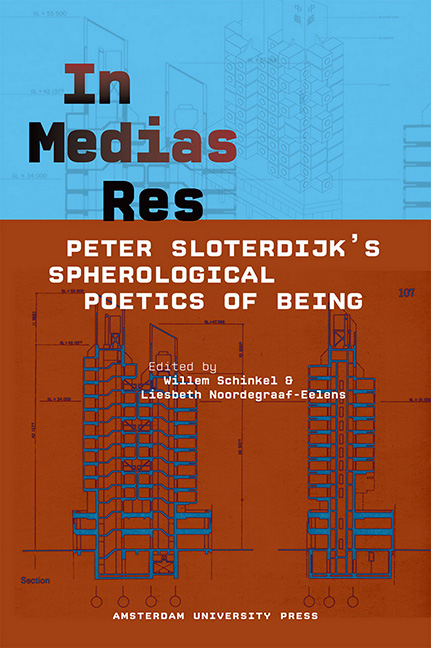Book contents
- Frontmatter
- Contents
- 1 Peter Sloterdijk’s Spherological Acrobatics: An Exercise in Introduction
- 2 Foamy Business: On the Organizational Politics of Atmospheres
- 3 “Transgenous Philosophy”: Post-humanism, Anthropotechnics and the Poetics of Natal Difference
- 4 Disinhibition, Subjectivity and Pride. Or: Guess Who Is Looking?: Peter Sloterdijk’s reconstruction of ‘thymotic’ qualities, psychoanalysis and the question of spectatorship
- 5 Sloterdijk and the Question of an Aesthetic
- 6 Uneasy Places. Monotheism, Christianity, and the Dynamic of the Unlikely in Sloterdijk’s Work – Context and Debate
- 7 The Attention Regime: On Mass Media and the Information Society
- 8 In the Beginning was the Accident: The Crystal Palace as a Cultural Catastrophe and the Emergence of the Cosmic Misfit: A critical approach to Peter Sloterdijk’s Weltinnenraum des Kapitals vs. Fyodor M. Dostoevsky’s Notes from the underground
- 9 A Cautious Prometheus? A Few Steps Toward a Philosophy of Design with Special Attention to Peter Sloterdijk
- 10 Sloterdijk and the Question of Action
- 11 The Space of Global Capitalism and its Imaginary Imperialism: An Interview with Peter Sloterdijk
- Contributors
- Index
8 - In the Beginning was the Accident: The Crystal Palace as a Cultural Catastrophe and the Emergence of the Cosmic Misfit: A critical approach to Peter Sloterdijk’s Weltinnenraum des Kapitals vs. Fyodor M. Dostoevsky’s Notes from the underground
Published online by Cambridge University Press: 23 June 2021
- Frontmatter
- Contents
- 1 Peter Sloterdijk’s Spherological Acrobatics: An Exercise in Introduction
- 2 Foamy Business: On the Organizational Politics of Atmospheres
- 3 “Transgenous Philosophy”: Post-humanism, Anthropotechnics and the Poetics of Natal Difference
- 4 Disinhibition, Subjectivity and Pride. Or: Guess Who Is Looking?: Peter Sloterdijk’s reconstruction of ‘thymotic’ qualities, psychoanalysis and the question of spectatorship
- 5 Sloterdijk and the Question of an Aesthetic
- 6 Uneasy Places. Monotheism, Christianity, and the Dynamic of the Unlikely in Sloterdijk’s Work – Context and Debate
- 7 The Attention Regime: On Mass Media and the Information Society
- 8 In the Beginning was the Accident: The Crystal Palace as a Cultural Catastrophe and the Emergence of the Cosmic Misfit: A critical approach to Peter Sloterdijk’s Weltinnenraum des Kapitals vs. Fyodor M. Dostoevsky’s Notes from the underground
- 9 A Cautious Prometheus? A Few Steps Toward a Philosophy of Design with Special Attention to Peter Sloterdijk
- 10 Sloterdijk and the Question of Action
- 11 The Space of Global Capitalism and its Imaginary Imperialism: An Interview with Peter Sloterdijk
- Contributors
- Index
Summary
The century's biggest issue will emerge from the catastrophe of traditional culture and its holistic morality: making the immune systems explicit.
A briefing
“Philosophy is a briefing” is the eo ipso and slightly strategic and business-like quote from Peter Sloterdijk's Versuche nach Heidegger; it is also slightly broken down to size within the realm of quotidian management. However, what could be better than being invited to a briefing – especially since it connotes presenting solid facts and requesting our expert opinion (if we have one)? “Briefing” initially sounds inviting and like solution-oriented optimism. But since we know that solutions rarely bring us much further – not only because more solutions are circulating in the world than problems, which in itself causes more problems – a certain scepticism towards a scheduled briefing is appropriate. But what is the situation at hand? Is it the state of the nation or the state of the world? The state of thinking and the state of existence? The state of mankind and its dwellings? Or is it the state of all these meta-, para-, post- and neo-designs of the nation and the world, thought and existence, mankind and its dwellings? According to Sloterdijk, being in the right state means, a priori, moving with the times. But moving also implies falling, experiencing or the turn.
From my perspective there is no greater challenge today than entering into the labyrinth of Sloterdijk's hyperboles, parabolas and trains of thought, and thus into the disaster of self-forgetfulness, into the rush of acclamation of the same while simultaneously remaining left behind, blessed and speechless, in the sense of staying in place or falling. My personal practice is designed to flee this narcotic effect and take a stance, even if this fails to relieve me of my blessed and speechless state. No matter, because in searching for Sloterdijk's profile behind all of these briefings on Spheres, the Crystal Palace, indulgence and comfort machines, immune systems and emergencies I think I can identify the “Highlander”, or the “Störtebeker”, the Nordic Hun, a blonde man of grand stature who is going for his guns.
- Type
- Chapter
- Information
- In Medias ResPeter Sloterdijk's Spherological Poetics of Being, pp. 133 - 150Publisher: Amsterdam University PressPrint publication year: 2012



